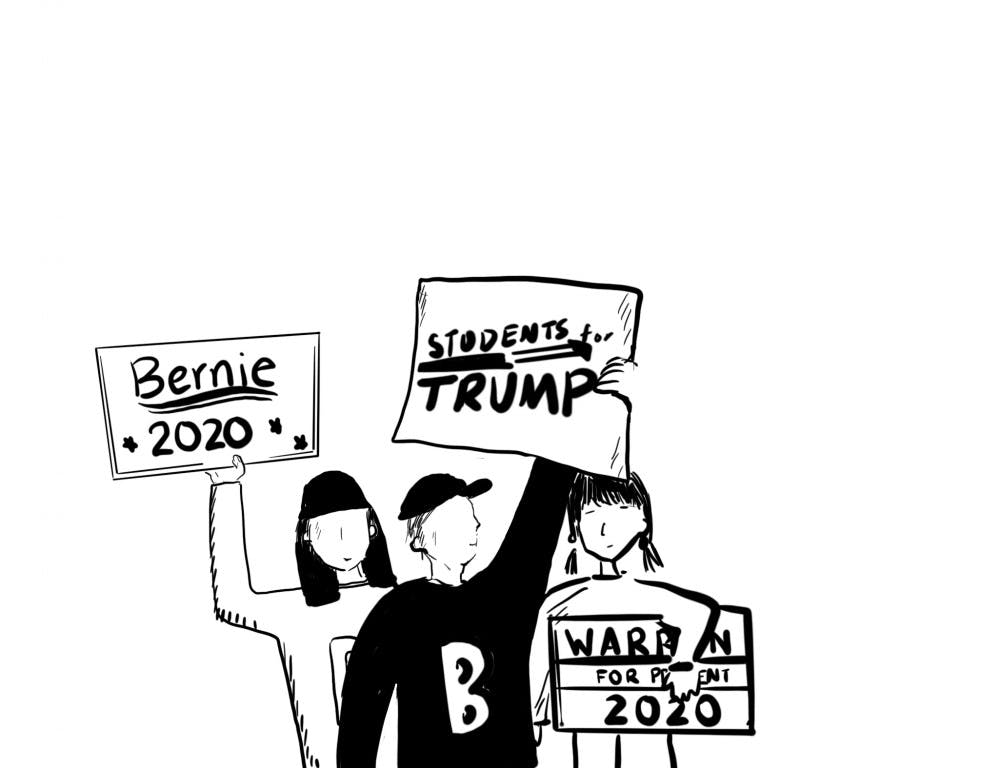This fall, while some students will look forward to apple-picking, pumpkin spice lattes and shopping period, others will trade in their textbooks and backpacks for long workweeks spent knocking on doors and organizing communities.
Citing the importance of the 2020 Presidential Election this November, these students will be taking a leave of absence from the University to work on political campaigns.
For Seth Goldstein ’22, it’s an issue deeply tied to his home state of Wisconsin, where he plans to return to canvass in the fall.
“Wisconsin is one of the three states that Trump (marginally won by) the electoral vote, and it was by (22,000) votes. I just remember that feeling of ‘Oh my god, how is it that my state is the one that elected this guy?’” Goldstein said. “How could I be here, thinking about political action when I have the most important opportunity to practice it?”
For other students, their roles in campaigns are tied to the future of specific issues that are important to them.
“This election is kind of the last chance we have to turn things around and avoid the worst of climate change, so that’s what gives me the biggest feeling of urgency. The main reason why I decided to consider (going on leave) is because it feels like I can’t just sit on the sidelines and watch things unfold,” said Galen Winsor ’22, who plans to work on a House or Senate race in New England this fall.
“This election is too important, and I can’t really imagine being on a college campus while it’s going on,” added Matt Rauschenbach ’23, who plans to work on the campaign of the Democratic nominee. “Should we lose the House or continue to not have control of the Senate, whoever is President for the next four years is going to be pretty important.”
While Goldstein, Winsor and Rauschenbach have considered careers in politics, their main motivation for working on a campaign is promoting progressive politics, rather than advancing their careers.
“It will be incredible to get six months of experience working on a campaign, and I’ll get a lot of understanding of how those things work, but it’s a lot about electing someone.” Goldstein said.
Rauschenbach echoed Goldstein’s sentiment: “It is in some ways a career stepping stone, but it’s also important that we make progress.”
It is not rare for students at Brown to take time away from their studies.
“It is pretty common that in a given year we would have between 160 and 200 students taking leave” for a variety of reasons, Deputy Dean of the College Christopher Dennis said. According to Dennis, the University typically sees an increase of student leavetaking during election years.
“Brown is pretty easygoing about leaves. Generally, when the deans are speaking to students they are really helping to clarify goals for the leave and what people want to accomplish,” Dennis added.
Goldstein said that the deans were very accommodating about his leave. “I talked with one Dean who was like, ‘Yeah, I think you should do it, … you will make a big difference,’” Goldstein said.
But taking leave is not without its challenges.
“I’m not going to be finding housing in the same way other second-years are. I’m leaving my friends for a semester, and I’m not (going to) have a ton of time to keep in contact, which is a little sad,” Rauschenbach said.
Winsor added that “it definitely feels a little strange imagining graduating a semester later. It’s mainly the social aspect … I want to be able (to) be with the people I care about at Brown.” But he emphasized that it still feels like a “really important and powerful moment in our nation’s history, and I really want to know that I did all I could to defeat Trump and turn around the House and the Senate.”
To Goldstein, this moment “feels like a cross country race: the feeling when you’re tired, and you’re not done yet, and it is like I could give up now and cruise to the finish, and I would be fine, or I could really work; I could do really well. ... I can either mail in a ballot and go home and work in the summer, or I could really push, and commit to doing this until November and just do it. It’s exciting. It’s daunting.”
For Rauschenbach “it is a moral imperative.”





